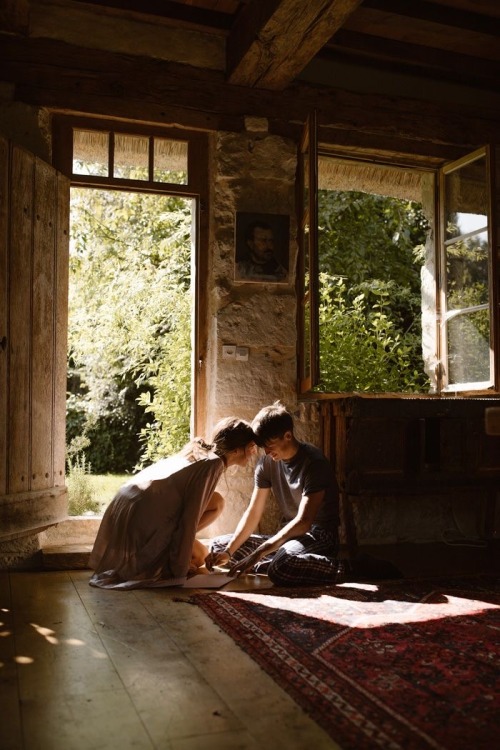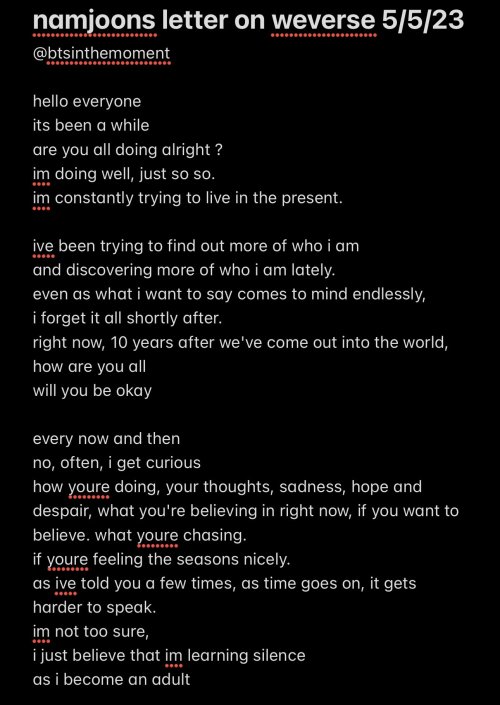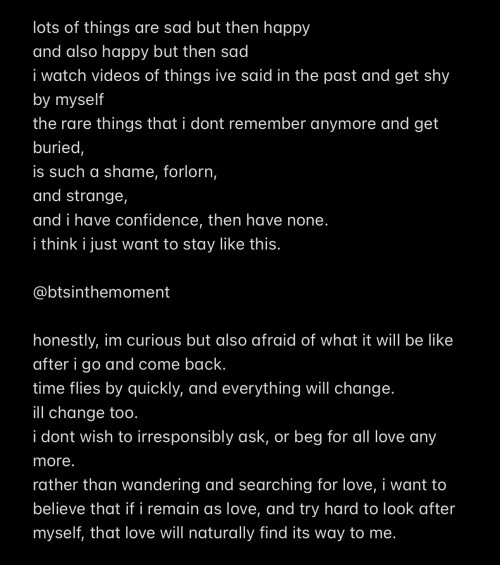
"They left storms, but she was meant to dance in the rain" - VENTUM ||Anya || She/her || 22 y/o
44 posts
Wintertaescape - Tumblr Blog
Yandere writers: writing about some seriously demented, craftily dark stuff which highlights some of the worst of humanity.
Also Yandere writers: literal drops of sunshine who are some of the best, most mature and interesting people you could ever interact with online.
in the mood for sleeping lazily in someone's arms and them stroking my hair
“When people don’t express themselves, they die one piece at a time. You’d be shocked at how many adults are really dead inside — walking through their days with no idea who they are.”
— Laurie Halse Anderson, Speak
Imma tag everyone who I know is gonna appreciate this
Tagging: @vvh0adie @kookieswan @pamzn @justanotherstarlightmonger


jadepicon via instagram
things that fall
petals,
when the flowers you brought me have withered, and the sun is too strong in my eyes.
tears,
when the pain in my chest gets too heavy to bear, and my heart beats a certain way when i think of you.
snowflakes,
as the dry air makes my lips bleed into the cracks of the words i couldn’t say when you buried your head in my neck.
rain,
as i sit in my window, the woollen grey clouds as dark as the deliquescent threads in my head.
stars,
when all i wish for is to feel your breath against my face. you sigh and i trace my thumb over your brow.
tides,
because the moon is drifting away from the earth as you are from me.
eyelids,
because my eyes are paper thin from the fever on my forehead. it’s too warm and i’m drenched in sweat. it burns to touch them.
time,
because love becomes infinitely heavier when it has nowhere to go.
shadows,
of two lovers slow dancing in a burning room.
leaves,
as you tread over the maple hope that we would last; crushing them under your feet and over my chest.
the sun,
in my sky, colourless without your palette. i’m begging you to stay. you’re crying now. you rub your nose against mine and i don’t want to live beyond this moment.
and i, for you.
i fall for you. like everything that falls.
- written by me

Job ad! Come be my coworker! I work at Vox’s Future Perfect, a grant-funded effective-altruism-inspired vertical focused on high impact writing on some of the world’s most important problems. Some of the stories I’m proudest of over the last few years has covered the case for catastrophic AI risk, the rise of plant-based meat, progress towards malaria vaccines, and the case for better biosafety and pandemic preparedness (unfortunately, those pieces all look really good in retrospect). Now, we’re expanding Future Perfect! We’ll be hiring three full-time fellows for a one-year fellowship. Starting salary depends on your experience but Vox’s minimum salary for any role is $56,000. You’ll write for Future Perfect on any of the above topics or other topics of global importance that you want to become an expert in and bring to our audience. You don’t need to have a journalism background; I think the most important qualification is a commitment to understanding and improving the world, with the EA lens that makes Future Perfect different from everything else in journalism. If you’re potentially interested and want to know more about what working at Vox/at Future Perfect is like, feel free to reach out to me here or at [email protected]. And please share this post: I think hiring the right people will make a huge difference to the potential value of the Future Perfect fellows program.
There is sadness, joy, hope and fear in Namjoon's words.


when u come up with a tiny change for your story that not only makes the writing flow better but also hammers in the character motivations and story theme

50 WORDS TO USE INSTEAD OF “SAID”
Do you ever find yourself over-using the word “said” in your writing? Try using these words/phrases instead:
stated
commented
declared
spoke
responded
voiced
noted
uttered
iterated
explained
remarked
acknowledged
mentioned
announced
shouted
expressed
articulated
exclaimed
proclaimed
whispered
babbled
observed
deadpanned
joked
hinted
informed
coaxed
offered
cried
affirmed
vocalized
laughed
ordered
suggested
admitted
verbalized
indicated
confirmed
apologized
muttered
proposed
chatted
lied
rambled
talked
pointed out
blurted out
chimed in
brought up
wondered aloud
(NOTE: Keep in mind that all of these words have slightly different meanings and are associated with different emotions/scenarios.)
Guys who sing or play the instrument will always have a special place in my heart. Like yes, lets sing duets in the kitchen together, play your guitar for me under the tree we always sit under, lets do karaoke together with our friends and win every damn one, let's start a band together. Your music calls to me. I'll sing for you.
This is your Wake Up Call
Enough. This is your LIFE. Do you understand? Think 70 years left. Thats it. It's ridiculously short and yet here you are, stagnant, scrolling on your phone, mindlessly consuming useless junk. Get up. Wash your face and change your clothes. Go for a walk, or to the gym, or do some yoga (I don't care what just move your body, you need the goddamn exercise) and when you get back, make yourself some food with protein and fibre. Play some music and make your bed. I freaking guarantee you will feel better afterwards. Aren't you tired of living in the confines of mediocrity? This is your sign to pull yourself out of a rut and start fresh, even if it's 4pm in the afternoon. OK?
xoxo

5 posts!
show, don't tell:
anticipation - bouncing legs - darting eyes - breathing deeply - useless / mindless tasks - eyes on the clock - checking and re-checking
frustration - grumbling - heavy footsteps - hot flush - narrowed eyes - pointing fingers - pacing / stomping
sadness - eyes filling up with tears - blinking quickly - hiccuped breaths - face turned away - red / burning cheeks - short sentences with gulps
happiness - smiling / cheeks hurting - animated - chest hurts from laughing - rapid movements - eye contact - quick speaking
boredom - complaining - sighing - grumbling - pacing - leg bouncing - picking at nails
fear - quick heartbeat - shaking / clammy hands - pinching self - tuck away - closing eyes - clenched hands
disappointment - no eye contact - hard swallow - clenched hands - tears, occasionally - mhm-hmm
tiredness - spacing out - eyes closing - nodding head absently - long sighs - no eye contact - grim smile
confidence - prolonged eye contact - appreciates instead of apologizing - active listening - shoulders back - micro reactions
A Comprehensive Guide for Writing Advice
Sometimes, despite enjoying writing so much, something is not working for you. Maybe your well of ideas has run dry. Or your WIP has hit a corner and you can't find your way out to the end of the story. Or you need to go back to your finished draft and see if there are any kinks to clear up.
Fortunately, everyone at Writeblrcafé has experienced such, and to help you out, we have a bunch of links to helpful posts by fellow writers to help you along on your writing journey as well as some helpful links to other websites, resources and software.
General:
WHY IS WRITING IS SO FUCKING HARD? (@writers-hq)
Writer Block First Aid Kit (@isabellestone)
Websites for writers (masterpost @2soulscollide)
Writing advice (masterpost @theliteraryarchitect)
Writing resources (masterpost @stinastar)
One look thesaurus (a reverse dictionary where you can enter words or concepts)
Coming Up with Ideas:
97 Character Motivations (@theplottery)
Character Flaws (@fantasyfillsmysoul)
Character Profile (@mistblossomdesigns)
Characters Unflawed (@emptymanuscript)
Why Theme is More Important than Plot (@theplottery)
Weekly writing prompts on Reedsy
Drafting:
3 of the worst story beginnings (and how to fix them) (@theplottery)
Cheat Sheet for Writing Emotion (@myhoniahaka)
Creative Writing for Writers (@writerscreed)
Describing Physical Things (@wordsnstuff)
How to Craft a Natural Plot (@theplottery)
How to Write a Story? (masterpost @creativepromptsforwriting)
How to write: ethnicity & skin colour (@youneedsomeprompts)
What the F is Show Not Tell (@theplottery)
Writing advice from my uni teachers (@thewritingumbrellas)
First Draft: story outlining template meant to help with planning your next big writing project (@fauxriot)
The wonder/ discovery arc (@evelynmlewis)
How to structure a chapter (@theplottery)
How to pace your storytelling (@charlesoberonn)
How to write and research mental illness (@hayatheauthor)
Editing/Revising:
Eight steps in making the editing process of your book easier (@joaneunknown)
Kill Your Darlings (@tibodine)
Self editing tips (first pass) (@projecttreehouse)
How to critique your own writing (@emeryleewho)
Publishing:
Chill Subs: biggest database for literary magazines and small presses; track your submissions and get your writing published!
5 steps to get your novel ready to self-publish (by @nanowrimo)
Resources for finishing and publishing your novel (masterpost by @nanowrimo)
For self-publishing: this page gives you the exact pixel count of a book spine based on its page count, and/or a template you can use for the correct width/height ratio.
Software:
Scrivener: one time payment of $60 or 70€ (macOS/windows), $24 (iOS; no Euro listed for iOS); used by professionals, many tools to write and organize your novel
Bibisco: free and "pay what you want" version; multilingual, world building, character profiles, writing goals, story timeline, mind maps, notes and more templates to write a novel.
Manuskript: free open source-tool; outliner, novel assistant, distraction-free mode
Ghostwriter: a free and open alternative which has a decent interface with some interesting features, like Hemingway Mode, which disables one's backspace and delete keys, emulating a typewriter.
NaNoWriMo: an international contest to encourage writers to finish writing their novel with many events, groups for exchange with fellow writers, helpful writing advice and help for self-publishing and publishing traditionally.
Let us know in the comments if there are any links we could add to it! Reblog this post to help a fellow writer.
Support our work by buying a cup of coffee on KoFi.
3 of the worst story beginnings (and how to fix them)
Big no-no’s for story openers!
Now, don’t get me wrong - every type of story beginning can come out really well if you write it well, a skilled writer can make your typical wake-up-morning-routine-with-the-hero sound super interesting, but 9 times out of 10, this is not the case.
Especially if you are JUST starting out on your writing journey, I’d highly recommend to test out an unexpected opener for your story instead. Think of what makes your hero different, and HOW their normal is different than someone else’s.
#1 Waking up
Your protagonist wakes up to their alarm, tries to turn it off and drops the clock or breaks it. They get up and get ready for their day, typically while describing themselves in the mirror and telling us about their daily routine. Yawn. Pun intended.
✔️ The fix: If you’re going to start with a character’s wake-up routine, show us why it’s interesting. What’s different about their routine that could take your readers off-guard? Do they get up in the middle of the night? Inside a bunker? A submarine? If their routine is just like everyone else’s, there’s no reason to show it.
#2 Traumatic flashback
As soon as we open the book, we’re thrown into some kind of important and emotional moment of your protagonist’s life that happened years ago. The problem? We aren’t familiar with the protagonist yet, so we’re not going to care what happened to them.
✔️ The fix: Save the big important flashbacks for later. If you immediately hit with the biggest punch, then what is there to work up to? If you’re starting with a flashback, make sure it’s one that paints the character’s internal conflict well and makes us root for them.
#3 Exposition
Commonly found in prologues and first chapters, when we learn all about the story world, its history, the relationships between the characters in this scene, and their backstories. Also known as a surefire way to bore your readers before they’ve even started reading.
✔️ The fix: Subtext. Train yourself to think through subtext, and trust that your readers are smart enough to pick up on it. When we start the story we don’t care about the fascinating things of your world and complex backstories. We want to get to know who the characters are, and let them slowly reveal all the puzzle pieces through the book.
My final piece of advice is to focus on creating questions for your readers to wonder about, and resist the temptation to answer those until later chapters.
Did you hear I’ve got a Youtube channel? Subscribe through [the link here] or below, and watch my latest video about Creating Complex Characters!

Why theme is more important than plot
A super important lesson about writing that completely changed my mindset a few years ago, and I hope it helps you get there yourself if you’re stressing too much about the plot.
Worried about your plot not being good enough? It might be time to switch gears.
Any good story that stays with the reader will have compelling themes. You might not remember exactly what happens in the book, but you’ll remember how it made you feel. Wanna know why?
Because it had a strong theme, message or story question. So let’s break this down.
The theme → the true meaning of the story and its existence The plot → a device that delivers the theme in a digestible sequence of events
Do you know what your theme is? Do you know what question you’re asking with your project?
To figure this out, you need to understand why you chose this specific moment in this specific character’s life to tell the story.
What sort of change occurs in them?
What sort of message do they learn?
Why is this a pivotal moment in their life?
This is how you’ll learn what your story is truly about, underneath the plot. Think of your plot as the vehicle, and your story question/theme as the driver.
If your plot doesn’t carry the subtext of your theme, it’s going to have a hard time sticking in your reader’s head.
Also...
Did you know I have a Youtube channel? Subscribe and watch my latest videos through [the link here] or below!

Character Flaws
When creating characters, it's all too easy to envision the most perfect people, especially when it comes to creating love interests. Even our loveable morally grey characters are mostly perfect, if only they would stop killing...
So, here are a list of some flaws (based on personality, not appearance) to help round out your characters. While it's nice to be good at everything, it's abnormal. No one is perfect, and your characters will be much more relatable if you knock them down a bit.
Please note, none of these are (specifically) mental disorders, as I don't consider those a character flaw.
The Good (aka little flaw):
Absent-minded, aimless, argumentative, audacious, awkward, blunt, bold, boring, capricious, childish, clumsy, competitive, complainer, cowardly, critical directionally-challenged, dubious, finicky, fixated, flake, flirty, foolish, gossipy, gruff, gullible, hedonistic, humourless, hypocritical, idealist, idiotic, ignorant, illiterate, immature, impatient, impetuous, impulsive, incompetent, inconsiderate, indecisive, indifferent, indomitable, irrational, lazy, lustful, materialistic, meddlesome, meek, mischievious, nagging, naive, nervous, nosey, obnoxious, overambitious, overconfident, overemotional, overprotective, overzealous, passive-aggressive, paranoid, peevish, perfectionist, pessimist, pest, predicatable, pretencious, prideful, rebellious, renege, rigorous, sarcastic, skeptic, seducer, selfish, self-righteous, shallow, slacker, solemn, spacey, spoild, squeamish, stubborn, supersticious, sycophant, tactless, tease, tempermental, tenacious, theatrical, thoughtless, timid, unpredictable, unsupportive, vain, workaholic
The Bad (aka big flaw):
Addiction, adulterous, aloof, anxious, apathetic, arrogant, belittling, belligerent, bigmouth, bitter, bully, callous, deceptive, dependant, deranged, dishonest, disloyal, disrespectful, egotistical, envious, erratic, exploitive, fanatical, fickle, fierce (at the extreme), gluttonous, greedy, harasser, hubris, impious, infamy, intolerant, judgemental, lewd, liar, meglomaniac, morally grey, narcissistic, negligent, obsequious, obsessive, offensive, prejudiced, quixotic, reckless, rigid, self-martyr, self-righteous, short-tempered, spiteful, squanderer, stingy, unethical, unforgiving, untrustworthy
The Ugly (aka cross the street when you see this person):
Abusive, bigot, controlling, cruel, explosive, immoral, inhumane, intolerant, machiavellian, manipulative, murderous, neglectful, oppressive, racist, remorseless, possessive, self-destructive, threatening, treacherous, vengeful, vindictive, violent
The seven chief features of ego: self-deprecation, self-destruction, martyrdom, stubbornness, greed, arrogance and impatience.
Some of these may not even be considered flaws, and some may jump from one category to the next. It's all about how you present these flaws in your characters.
Have any more to add? Did you find this useful? Let me know down in the comments :)
WEBSITES FOR WRITERS {masterpost}
E.A. Deverell - FREE worksheets (characters, world building, narrator, etc.) and paid courses;
Hiveword - Helps to research any topic to write about (has other resources, too);
BetaBooks - Share your draft with your beta reader (can be more than one), and see where they stopped reading, their comments, etc.;
Charlotte Dillon - Research links;
Writing realistic injuries - The title is pretty self-explanatory: while writing about an injury, take a look at this useful website;
One Stop for Writers - You guys... this website has literally everything we need: a) Description thesaurus collection, b) Character builder, c) Story maps, d) Scene maps & timelines, e) World building surveys, f) Worksheets, f) Tutorials, and much more! Although it has a paid plan ($90/year | $50/6 months | $9/month), you can still get a 2-week FREE trial;
One Stop for Writers Roadmap - It has many tips for you, divided into three different topics: a) How to plan a story, b) How to write a story, c) How to revise a story. The best thing about this? It's FREE!
Story Structure Database - The Story Structure Database is an archive of books and movies, recording all their major plot points;
National Centre for Writing - FREE worksheets and writing courses. Has also paid courses;
Penguin Random House - Has some writing contests and great opportunities;
Crime Reads - Get inspired before writing a crime scene;
The Creative Academy for Writers - "Writers helping writers along every step of the path to publication." It's FREE and has ZOOM writing rooms;
Reedsy - "A trusted place to learn how to successfully publish your book" It has many tips, and tools (generators), contests, prompts lists, etc. FREE;
QueryTracker - Find agents for your books (personally, I've never used this before, but I thought I should feature it here);
Pacemaker - Track your goals (example: Write 50K words - then, everytime you write, you track the number of the words, and it will make a graphic for you with your progress). It's FREE but has a paid plan;
Save the Cat! - The blog of the most known storytelling method. You can find posts, sheets, a software (student discount - 70%), and other things;
I hope this is helpful for you!
(Also, check my gumroad store if you want to!)

Writer Block First Aid Kit
We’ve all been there. Some people have it all the time. Some say it doesn’t exist. I class writer’s block as anything from lack of motivation to not being able to solve a plot problem. Whatever it is, here’s a list of activities to try and get those creative rivers running.
Move. Pick up your laptop and go to a different room. They say a change is as good as a rest and this can be true with writing. Move to the kitchen. Write outside. Go to a coffee shop. Sit in the cupboard under the stairs and block out the world. Just change up the scenery.
Swap Medium. If words just aren’t doing it for you make aesthetics, mood boards, draw maps or characters. Victoria Aveyard once said she designed book covers and let the plot stew in the back of her mind.
Write Something Else. Working on other projects can give you inspiration for what you’re working on now. Find some prompts. Write irrelevant short stories or character studies. Write about your characters as kids or at defining points in their lives.
Plot. Hands off the keyboard, open up one of those many unused notebooks I know you have and start scribbling vague, half formed ideas. Allow yourself to write things you might discard later. Allow yourself to try and work through an idea you like but don’t understand yet. Try and work out the next 10 steps. 10 things you want to cover. 10 scenes. 10 days. Whatever it is, just write it down.
20 Minutes Rule. I’ve said this before and I’ll say it again. Sit your butt down in that chair and write for 20 minutes. I don’t care if it’s trash. I don’t care if you’re going to delete it all later. I don’t care if it’s nonsense. Do it. 20 minutes of writing nonsense is still more productive than 20 minutes staring at that wall. After 20 minutes if you still don’t want to write, leave it, but you just might find yourself inspired.
Finally, Take Time Off. If none of this is working, it’s likely a sign of burn out. Take some time for yourself and just do nothing. “Write every single day,” yeah sure if you wont to be a machine who pumps out words instead of art. Sometimes you need to recharge before you move forward and that doesn’t just mean getting a good nights sleep. Look after yourself and be kind. This isn’t a race against the clock, you have your whole life to publish a book.
[If reposting to instagram please credit my insta account @isabellstonebooks]







